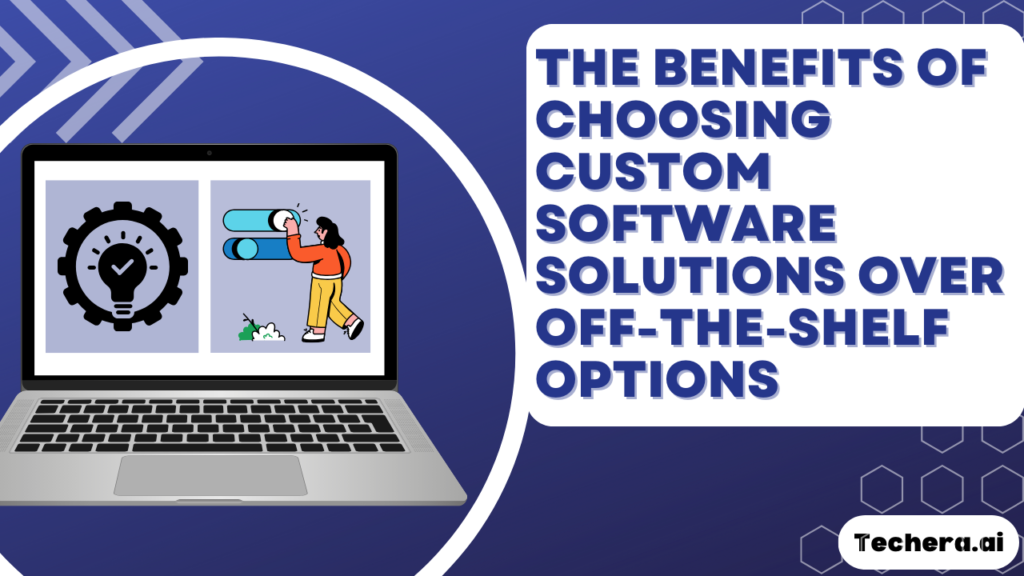
Discover why custom software solutions are the smarter choice for businesses seeking flexibility, scalability, and efficiency. Unlike off-the-shelf software, custom solutions are tailored to meet specific needs, enhance productivity, and provide a competitive edge. Learn how investing in personalized software can optimize operations and drive long-term success.
Introduction
In today’s fast-paced business world, software solutions play a crucial role in improving efficiency and productivity. Companies often face the choice between custom software solutions and off-the-shelf software. While off-the-shelf software offers quick solutions, custom software provides tailored features that align perfectly with a company’s specific needs. But which option is better for your business? Let’s explore why custom software solutions often come out on top.
Understanding Custom Software Solutions
Custom software is designed specifically for a business, catering to its unique processes, requirements, and challenges. Unlike pre-built software, which serves a broad audience, custom software is tailored to provide maximum efficiency.
Understanding Off-the-Shelf Software
Off-the-shelf software is mass-produced and designed to serve multiple businesses across various industries. QuickBooks, Adobe Photoshop, and Microsoft Office are a few examples. While these solutions can be cost-effective initially, they often lack the flexibility to fully meet a company’s evolving needs.
Key Benefits of Custom Software Solutions
1. Tailored to Specific Business Needs
Custom software is built from the ground up to align with your company’s goals, ensuring a seamless fit with your existing workflows.
2. Greater Flexibility and Scalability
Custom solutions can be modified and scaled as your business grows, ensuring they remain relevant over time.
3. Competitive Advantage
With custom software, businesses gain unique capabilities that set them apart from competitors using generic tools.
4. Better Security and Data Protection
Mass-produced software is a common target for cybercriminals, while custom-built solutions have advanced security measures tailored to your business’s needs.
5. Seamless Integration with Existing Systems
Custom software integrates easily with other tools and systems, reducing disruptions in daily operations.
Also Read : Why Custom Software Solutions Are Essential for Modern Enterprises
Limitations of Off-the-Shelf Software

- One-Size-Fits-All Approach: Lacks personalization, leading to inefficiencies.
- Limited Scalability and Flexibility: Difficult to modify as business needs evolve.
- Security Concerns: Popular software is a frequent target for cyber threats.
- Hidden Costs and Licensing Issues: Upgrades, support, and additional features often come at extra costs.
Cost Comparison: Custom vs. Off-the-Shelf Software
While custom software requires a higher initial investment, it offers better ROI in the long run. Off-the-shelf software often has hidden costs, including licensing fees, additional users, and upgrades.
Scalability and Future-Proofing
Custom software evolves alongside your business, while off-the-shelf solutions often struggle to keep up with growth.
Security Considerations
Custom software includes tailored security measures, making it less vulnerable compared to widely used off-the-shelf software.
Integration with Existing Systems
Custom software ensures seamless integration, reducing compatibility issues that commonly arise with off-the-shelf software.
Support and Maintenance
With custom software, businesses receive dedicated support, whereas off-the-shelf solutions depend on vendor availability and policies.
Customization and User Experience
Tailored user interfaces enhance usability, whereas off-the-shelf solutions offer limited customization.
Case Studies of Businesses Benefiting from Custom Software

- Company A: Increased efficiency by 40% using custom CRM software.
- Company B: Reduced cybersecurity breaches by 60% with custom security solutions.
How to Pick the Best Software for Your Company
- Assess your business needs and budget.
- Consider long-term scalability.
- Analyze the ROI of custom vs. off-the-shelf software.
Steps to Develop Custom Software
- Define business requirements.
- Select the right development team.
- Design, develop, and test the software.
- Deploy and provide ongoing support.
Conclusion
While off-the-shelf software may seem like an easy choice, custom software offers unparalleled flexibility, security, and scalability. Investing in a solution tailored to your business ensures long-term success and efficiency.
Frequently Asked Question
Q. Is custom software more expensive than off-the-shelf solutions?
A. Initially, yes, but it provides greater value and long-term savings.
Q. How much time does it take to create unique software?
A. The timeline depends on complexity, typically ranging from a few months to a year.
Q. Can custom software integrate with existing tools?
A. Yes, it can be designed to seamlessly integrate with your current systems.
Q. Is custom software more secure than off-the-shelf software?
A. Absolutely. Custom security features reduce vulnerabilities to cyber threats.
Q. When should a business opt for custom software?
A. When scalability, security, and tailored functionality are priorities.

